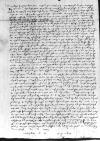Letter #5846
Gdańsk Town Council to Ioannes DANTISCUSGdańsk (Danzig), 1531-07-04
| received Brussels, 1531-08-24 Manuscript sources:
Auxiliary sources:
Prints:
| ||||||||||||
Text & apparatus & commentary Plain text Text & commentary Text & apparatus
Dem Erwirdigenn in Goth Hernn, hern
Erwyrdiger in Goth, / Gnediger Herre.
Unszernn freuntlichen grusz / myth beheglichen diensts erbiethunge stecz bevoran.
Gnediger Herre. /
Es seindt unsz Ewer Gnaden andtwerth cf.
Szo mogen wyr Ewer Gnade sachern grundes nicht bergen, das wyr ymmers Ewer Gnade als die wyr in ubunge koniglicher und tapferer gescheffte etzliche irer heer czu szeynde gemerckt haben / mith geburlicher estimation und vorhaltunge in unsern gemuthen nicht alleynn freuntlich und wolmechtick hynderfolget, szunder auch etzlich moel mith unsern schrifften angesucht wie auch noch in negst vorgangenem jare / unsers rats geschicktenn szo daszmol bey
Worinne unsz Ewer Gnade gantzer und dienstlicher zcuvorsicht gutlichenn enthschuldiget nehmen wyrdt welchs wyr dan hernochmols furderlich zo Ewer Gnade unsz und unser stadt was neher (als wyr kurtzlich zcubeschehende vorhoffen) kommen wirdt / in ebentrechtigem gutten willen und gefallen zcubeschulden wellen der gebuer b <e> funden werden. Das wyr auch Ewer Gnade der geschicklickeit erfynden, das dieselbige auch allen und itzlichenn unwillenn, / zo villeichte bey etzlichenn privaten lewthen (wie Ewer Gnade schreybet) jegen dieselbigen enthstanden gantz und gaer thut vorgessenn etc. Horenn wyr eyn solchs myth froluckunge von hertzen gerne und kan nicht anders dan Ewer Gnaden zcu ehren gedewtet werden, das wyr auch nicht anders dan Ewer Gnade erbarn gemuthe und togunth (das sich in dem fall selbst scheynlich angibt) zcumessen / und thuen unsz sulcher wircklichen fruntht zo ausz unserm schreybenn (ane rhuem geret) erwachsen / mith Ewer Gnaden hochlich und preyslich frowen nicht zcweyfelnde es sulle sulche ruemliche guthwyllickeit zcwsschen Ewer Gnaden und unsz enthstanden tzu mehren gunst und gueter zcimlichen vorhaltunge des an unsz gaer keyn mangel szeyn sal) dergleichenn zcu unser stadt und eyns gemeynen guts ehre und nutze gedeyen. /
Wyr thuen unsz auch erstlich der grosen und gnedigen erbiethung, die Ewer Gnade jegen uns und unszer
Wo wyr dasselbige ummbe Ewer Gnade nochmals vordienen und ummbe die seynen / alles gunstigen wyllens und furderung beschulden konnen wellen wyr ungesporten wilfahrung und geneigten gemuets der thadt erfunden werden mith gotlichen hulff der Ewer Gnade lange gesuntheit vorleyen / auch kurtzlich in disz seyn
Datum
Derselbigen Ewer Gnade gantz willige

